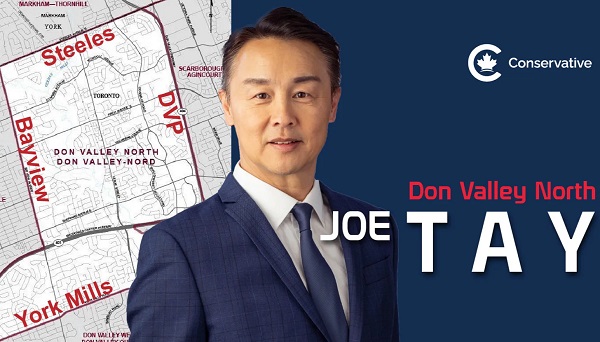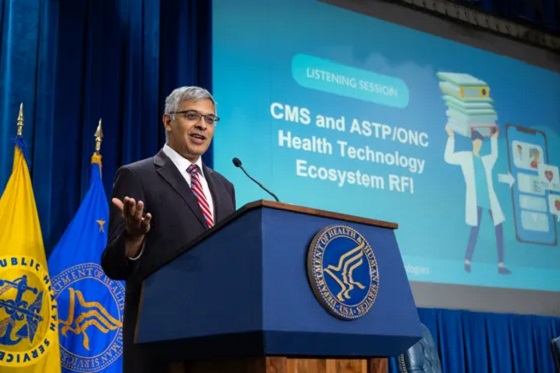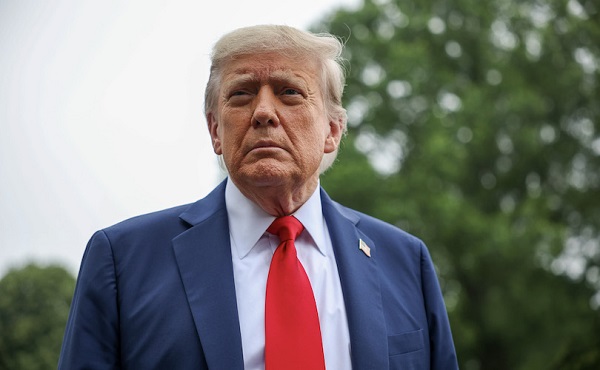espionage
Ottawa Raises Alarm With Beijing Over Hong Kong Detention of CPC Candidate Joe Tay’s Family

 Sam Cooper
Sam Cooper
Global Affairs Canada stated it “deplores the decision by Hong Kong authorities to punish people for actions that amount to nothing more than freedom of expression.”
Ottawa has “raised its strong concerns directly with both Chinese and Hong Kong authorities” and is monitoring the circumstances surrounding the detention and interrogation of family members of former Conservative election candidate Joe Tay in Hong Kong, Canada’s national intelligence agency confirmed to The Bureau today.
“Global Affairs Canada is aware of Mr. Tay’s family members being called in for questioning in Hong Kong. They are tracking the situation closely, and are in contact with Mr. Tay,” a CSIS spokesperson said.
The federal government issued a rare public rebuke, with Global Affairs Canada stating it “deplores the decision by Hong Kong authorities to punish people for actions that amount to nothing more than freedom of expression.”
“It is unacceptable that Hong Kong authorities have placed a bounty on the head of a Canadian citizen,” the CSIS statement added. “Issuing threats and intimidation against a Canadian citizen is transnational repression and will not be tolerated.”
Questioned by The Bureau on the circumstances surrounding the 2025 federal election, CSIS added that “in particular, when intelligence collected spoke to a threat to the safety of any candidate, CSIS shares this information with all relevant law enforcement partners.”
The confirmation of Hong Kong’s actions against Tay’s family follows The Bureau’s reporting that Hong Kong police detained his cousin and the man’s wife for questioning on Thursday in the Fo Tan district. The incident—deemed credible by Canadian and diplomatic sources—appears to be a targeted act of intimidation tied to Tay’s high-profile candidacy in the 2025 federal election.
Tay, 62, ran as a Conservative candidate in Don Valley North and lost by approximately 5,000 votes. He was heavily targeted by Chinese Communist Party (CCP) influence networks during the election, with PRC-linked WeChat accounts spreading disinformation and narratives portraying Canada as a “refuge for fugitives” if he were elected.
As The Bureau previously revealed, the RCMP advised Tay to suspend in-person campaigning in the final week due to credible threats. The SITE Task Force assessed that Tay was subject to a coordinated foreign interference campaign and broader transnational repression effort.
The rhetoric used to discredit Tay was later echoed by Liberal MP Paul Chiang, who was supported by Prime Minister Mark Carney during the campaign. Chiang’s re-election bid collapsed after The Bureau confirmed that the RCMP had opened a national security review. The RCMP told The Bureau it has opened an investigation into the matter but would not provide further details.
The detentions of Tay’s relatives occurred just 48 hours after Prime Minister Carney’s closed-door meeting in Washington with U.S. President Donald Trump and Vice President J.D. Vance.
That Beijing appears determined to continue persecuting Tay’s family—even after his electoral defeat—signals a broader strategic aim and presents an early and consequential test for Carney, who campaigned on defending Canadian sovereignty while opposing Trump’s tariff regime. The timing—days after Carney’s White House meeting—suggests Beijing may be probing Ottawa’s resolve under new leadership.
In their statement, CSIS and Global Affairs Canada warned that transnational repression and foreign interference remain pervasive threats inside Canada, with CSIS and the RCMP dedicating significant resources to countering these efforts. They confirmed that during the 2025 election, the SITE Task Force monitored candidate safety, advised the government, and took active steps to mitigate threats.
CSIS also confirmed that SITE will publish a public post-election report summarizing the threat landscape, interference patterns, and actions taken during the writ period.
The Bureau has previously documented Beijing’s use of family-based intimidation as part of its global enforcement strategy. On April 10, 2025, The Bureau confirmed that the parents of Hong Kong activist Frances Hui were detained by Hong Kong national security police after Hui testified before Canada’s Parliament. Hui, now based in the United States, was previously followed and threatened by an alleged PRC agent who was later indicted—but not convicted—by U.S. authorities.
Tay’s case fits that pattern. The Bureau has learned that a report reviewed by Toronto police during the campaign included a stalking threat involving Tay’s team.
The formal charges against Tay were issued by Hong Kong police in December 2024. According to official documents reviewed by The Bureau, Tay—born 12 December 1962—was charged with incitement to secession and collusion with a foreign country or with external elements to endanger national security. Authorities allege that between July 2020 and June 2024, Tay operated a platform called HongKonger Station, through which he published “numerous videos inciting secession” and “repeatedly urged foreign countries to impose sanctions” on officials in Beijing and Hong Kong.
The SITE Task Force confirmed these charges were amplified by PRC intelligence-linked media during the Canadian election in an effort to delegitimize Tay and portray his candidacy as a threat to the PRC.
Editor’s Note: This story was updated to note the defendant in the Frances Hui case was not convicted.
The Bureau is a reader-supported publication.
To receive new posts and support my work, consider becoming a free or paid subscriber.
Invite your friends and earn rewards
Energy
China undermining American energy independence, report says

From The Center Square
By
The Chinese Communist Party is exploiting the left’s green energy movement to hurt American energy independence, according to a new report from State Armor.
Michael Lucci, founder and CEO of State Armor, says the report shows how Energy Foundation China funds green energy initiatives that make America more reliant on China, especially on technology with known vulnerabilities.
“Our report exposes how Energy Foundation China functions not as an independent nonprofit, but as a vehicle advancing the strategic interests of the Chinese Communist Party by funding U.S. green energy initiatives to shift American supply chains toward Beijing and undermine our energy security,” Lucci said in a statement before the Senate Judiciary Subcommittee’s hearing on Wednesday titled “Enter the Dragon – China and the Left’s Lawfare Against American Energy Dominance.”
Lucci said the group’s operations represent a textbook example of Chinese influence in America.
“This is a very good example of how the Chinese Communist Party operates influence operations within the United States. I would actually describe it as a perfect case study from their perspective,” he told The Center Square in a phone interview. “They’re using American money to leverage American policy changes that make the American energy grid dependent upon China.”
Lucci said one of the most concerning findings is that China-backed technology entering the U.S. power grid includes components with “undisclosed back doors” – posing a direct threat to the power grid.
“These are not actually green tech technologies. They’re red technologies,” he said. “We are finding – and this is open-source news reporting – they have undisclosed back doors in them. They’re described in a Reuters article as rogue communication devices… another way to describe that is kill switches.”
Lucci said China exploits American political divisions on energy policy to insert these technologies under the guise of environmental progress.
“Yes, and it’s very crafty,” he said. “We are not addressing the fact that these green technologies are red. Technologies controlled by the Communist Party of China should be out of the question.”
Although Lucci sees a future for carbon-free energy sources in the United States – particularly nuclear and solar energy – he doesn’t think the country should use technology from a foreign adversary to do it.
“It cannot be Chinese solar inverters that are reported in Reuters six weeks ago as having undisclosed back doors,” he said. “It cannot be Chinese batteries going into the grid … that allow them to sabotage our grid.”
Lucci said energy is a national security issue, and the United States is in a far better position to achieve energy independence than China.
“We are luckily endowed with energy independence if we choose to have it. China is not endowed with that luxury,” he said. “They’re poor in natural resources. We’re very well endowed – one of the best – with natural resources for energy production.”
He said that’s why China continues to build coal plants – and some of that coal comes from Australia – while pushing the United States to use solar energy.
“It’s very foolish of us to just make ourselves dependent on their technologies that we don’t need, and which are coming with embedded back doors that give them actual control over our energy grid,” he said.
Lucci says lawmakers at both the state and federal levels need to respond to this threat quickly.
“The executive branch should look at whether Energy Foundation China is operating as an unregistered foreign agent,” he said. “State attorneys general should be looking at these back doors that are going into our power grid – undisclosed back doors. That’s consumer fraud. That’s a deceptive trade practice.”
espionage
Trump admin cracks down on China’s silent invasion of U.S. science

Quick Hit:
The Trump administration has launched a sweeping national security investigation into foreign scientists working in U.S. research institutions, targeting those from adversarial countries like China amid fears of espionage and biological threats.
Key Details:
- The probe targets as many as 1,000 foreign scientists inside the NIH alone, focusing heavily on Chinese nationals.
- Intelligence agencies are involved following multiple arrests of Chinese researchers attempting to smuggle dangerous pathogens into the U.S.
- The effort comes after repeated GAO warnings and revelations from a Chinese defector who says Beijing embeds agents in American labs.
Diving Deeper:
The Trump Administration has launched an intensive, behind-the-scenes investigation into hundreds of foreign scientists working in American research institutions—many of them tied to China’s communist regime. According to officials, the review began weeks ago and involves coordination with intelligence and security agencies.
The sweeping audit—prompted by longstanding concerns of foreign influence, espionage, and theft of intellectual property—has zeroed in on nearly 1,000 researchers within the National Institutes of Health (NIH) alone. Most are believed to have gained entry to the U.S. with help from federal research agencies during prior administrations, often without proper vetting.
“The Trump administration is committed to safeguarding America’s national and economic security,” White House spokesman Kush Desai told Just the News. “Taxpayer dollars should not and cannot fund foreign espionage against America’s industrial base and research apparatus.”
That warning is no longer hypothetical. In just the last month, federal officials say three Chinese scientists were arrested attempting to smuggle deadly pathogens into the U.S., including toxic fungi and crop-destroying roundworms—raising fresh fears of agroterrorism.
According to Dr. Li-Meng Yan, a Chinese virologist who defected to the U.S. in 2020, many scientists entering the U.S. from China are effectively agents of the Chinese Communist Party. “They have signed the contract with Chinese government to go back to China, serve for China with whatever they can get from the U.S.,” Yan said. “They become the CCPs’ kind of agents… like the parasites that go into your body.”
Years of inaction from federal agencies are partly to blame. The Government Accountability Office (GAO) has issued more than a half-dozen scathing reports warning that the NIH and partnering universities lack the safeguards to prevent foreign theft of research and influence over scientific projects funded by U.S. taxpayers.
In one 2021 report, GAO bluntly stated that “U.S. research may be subject to undue foreign influence” and cited the NIH’s failure to enforce conflict-of-interest policies, particularly with scientists tied to China.
The crackdown now underway comes amid a surge of related criminal activity. In one case, Chinese scientist Hao Zhang was convicted in 2020 for a scheme dating back to 2006 to steal proprietary semiconductor technology and launch a competing business in China. In another, a cybersecurity professor at Indiana University, Xiaofeng Wang, had his home raided by the FBI earlier this year and was quietly fired, though he has not been charged with any crime.
As part of the broader clampdown, the NIH recently issued new guidance barring researchers from funneling U.S. tax dollars to foreign partners through sub-grants. And the FDA has now halted all trials that export Americans’ cells to labs in hostile nations for genetic engineering—an issue of growing concern.
Congressional allies are backing the administration’s effort, with Rep. Nathaniel Moran (R-Texas) calling for sweeping reforms. “We’ve got to strengthen our own systems from within,” Moran said, “and we’ve got to push back in the trade world, in the tariff world and in the business practices world against China.”
With growing evidence of coordinated foreign espionage and exploitation of U.S. research systems, the administration’s covert operation marks a critical step in defending national security—and could reshape how America handles scientific collaboration for years to come.
-

 Brownstone Institute2 days ago
Brownstone Institute2 days agoFDA Exposed: Hundreds of Drugs Approved without Proof They Work
-

 Energy1 day ago
Energy1 day agoChina undermining American energy independence, report says
-

 Business1 day ago
Business1 day agoTrump on Canada tariff deadline: ‘We can do whatever we want’
-

 Automotive1 day ago
Automotive1 day agoElectric vehicle sales are falling hard in BC, and it is time to recognize reality.
-

 Business1 day ago
Business1 day agoEurope backs off greenwashing rules — Canada should take note
-

 Automotive1 day ago
Automotive1 day agoPower Struggle: Electric vehicles and reality
-

 Business2 hours ago
Business2 hours agoCanada Caves: Carney ditches digital services tax after criticism from Trump
-

 Crime2 hours ago
Crime2 hours agoSuspected ambush leaves two firefighters dead in Idaho







